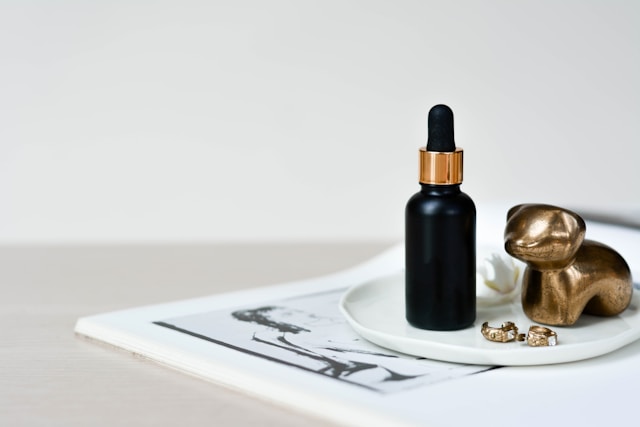5 Must-Have Makeup Products Every Beauty Lover Should Own in 2025
5 Essential Things to Look for in Your Serum

Serums are a staple in contemporary skincare routines for their concentration of active ingredients that represent specific skin issues. Selecting the best serum will contribute to healthy, younger, radiant skin by hydrating and keeping it clear.
Selecting the best serum can be daunting with so many options. This review makes sense of what to look for. This article covers ingredients, skin type suitability, texture, packaging, and cost.
Active Ingredients and What They Do: Choosing the Right Product for Your Skin
The most critical component of any serum is the active ingredients. Serums differ from creams or lotions because they contain potent ingredients that tackle serious skin issues. Serums, unlike creams and lotions, tackle specific skin issues well without any oils or softeners. Hyaluronic acid, one of the most popular serum ingredients, is the best at retaining water, leaving skin well-hydrated and plump. If you desire to combat aging signs, retinol, a derivative of vitamin A, is very effective.
It gets your skin to produce more collagen, accelerates the turnover of skin cells, and minimizes fine lines and wrinkles. Apply a little bit of retinol to sensitive skin and gradually increase. Vitamin C lightens the skin and protects it from UV rays and pollution very well. Salicylic acid cleanses pores and eliminates acne spots, and niacinamide provides universal benefits. It regulates oil, minimizes redness, and smooths your skin.
Peptides keep skin elastic, and green tea extract protects skin from environmental aggressors as antioxidants. You should consider how much of the active ingredients the serum contains when you are picking a serum. A serum that is too weak will not be effective, and one that is too strong will be irritating to your skin. Make sure the serum you choose has potent ingredients. Ensure there is a good mix with established results.
Skin Type Suitability: Selecting a Serum That's Suitable for You
One common mistake that individuals commit while selecting a serum is failing to think about their specific skin type. The effectiveness of a serum for one is not certain for another. Various skin types need varied care routines, and the application of an inappropriate serum can result in undesirable side effects like irritation, acne, or dryness. For individuals with dry skin, it is better to choose moisturizing serums containing hyaluronic acid, glycerin, or squalane.
These substances keep the skin moist and stop flakiness. You should choose lightweight, non-comedogenic serums for oily or acne skin. Niacinamide, tea tree oil, or salicylic acid can be selected as ingredients. A serum with both hyaluronic acid and niacinamide can successfully curb oiliness and stop clogging of pores for individuals with combination skin. Serums containing soothing substances like chamomile, centella asiatica, or aloe vera are suitable for sensitive skin. Steer clear of harsh chemicals like alcohol, strong fragrance, and high levels of exfoliating acids.
For individuals with mature skin, products containing anti-aging compounds like retinol, peptides, and vitamin C should be given top priority, as these molecules assist in curbing fine lines, wrinkles, and sagging of the skin. A proper serum can be a wonder for the skin; but, the application of an inappropriate one can be a source of trouble. It is better to perform a patch test before the application of a new serum. Apply a small amount to a hidden spot, wait 24 -hour wait and watch to see for any indication of allergy.
Texture and Absorption: Ensuring a Lightweight and Effective Formula
Consider the serum's texture and absorption into the skin when making your selection. A serum works well based on its ingredients and how deeply it gets into the skin. A good serum should be light and not greasy. It should not feel heavy or sticky and should absorb into the skin fast. Your skin type and personal inclinations will largely determine the best texture. Choose a mild, water-based serum that absorbs quickly if your skin is greasy.
Niacinamide, salicylic acid, or witch hazel are often found in serums to reduce oil and minimize pores. Thick serums give more moisture and nutrients to dry skin. Serums with retinol, ceramides, and peptides that are heavier or oil-based tend to work better on older skin types. These nutrients assist repair and revitalizing your skin while you sleep. The absorption rate is a critical factor.
A high-quality serum has into the skin and left it feeling hydrated and silky within 30 seconds to a minute. Your serum can not be good for your skin if it is sticky or hard to absorb. Think about the serum's compatibility with other skincare products as well. Your moisturizer or sunscreen cannot be working properly if you see tiny balls on your skin as you rub. To guarantee the proper skincare sequence, apply serums after cleansing and toning but before moisturizing.
Packaging and Stability: Keeping Your Serum Effective
The way a serum is packaged is very important for keeping its ingredients stable and working well. Heat, air, and light can readily destroy several vital components, including peptides, vitamin C, and retinol. Over time, this can reduce their effectiveness. A serum cannot function as well if it is not stored properly, which could produce disappointing outcomes. When selecting a serum, look for black, opaque, or tightly sealed vials. This prevents the components from decomposing.
Although glass bottle serums with droppers are common, product deterioration can be accelerated by air exposure while in use. Because they keep air out, preserve product freshness, and increase shelf life, pump bottles—especially those with airless pumps—are perfect. For freshness, choose an antioxidant-rich serum that comes in a bottle that is protected from the sun.
Store your serum somewhere cold and dry, away from moisture and sunshine. Certain serums, such as those containing probiotics, vitamin C, or retinol, might last longer if stored in the refrigerator. Additionally, before using a serum, be careful to verify the expiration date. Color, texture, or smell changes could be signs that the substance has degraded or lost its potency. Using a serum that has expired cannot be effective and can cause acne or skin irritation. Keeping your serum robust and functioning properly throughout use is facilitated by proper storage and packaging selection.
Price vs. Value: Finding the Best Serum for Your Budget
Just because a serum is expensive doesn't mean it's better. The quality is not necessarily indicated by the price. Excellent ingredients, unique formulae, and cutting-edge technologies are some of the reasons why certain pricey serums are more expensive. More people can now afford proper skincare because so many low-cost options offer the same advantages for far less money. Consider more than just the cost.
To make an informed choice, look at the packaging, active ingredients, active content, and customer reviews. Regardless of its price, a decent serum should provide noticeable effects. The drugstore carries a lot of skincare brands that sell serums containing retinol, niacinamide, and hyaluronic acid. These substances are just as effective as the more costly ones and have undergone testing.
By using cutting-edge techniques, fancy serums provide additional advantages like better absorption, longer-lasting effects, and increased efficacy. Make sure a pricey serum is long-term beneficial to your skin rather than merely cosmetic when you buy it. The best serum benefits your skin without the use of unnecessary substances, artificial fragrances, or gaudy marketing.
Conclusion
When choosing a serum, consider its ingredients, compatibility with your skin, feel, packaging, and cost. By knowing what your skin needs and looking into the best products, you can choose a serum that works well. Choosing a quality serum, whether budget-friendly or expensive, with proven ingredients is crucial for achieving healthier, glowing skin.








